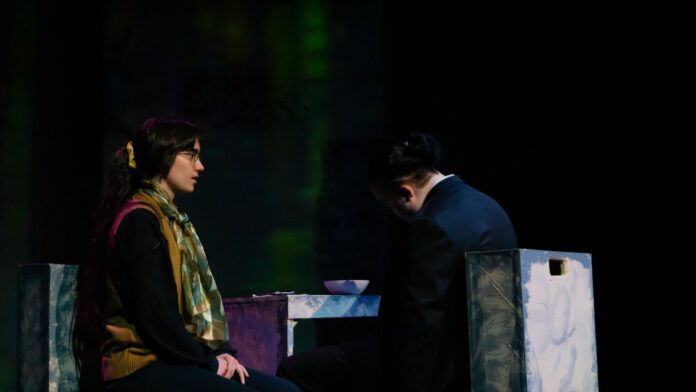
While at a café, a man dies. But his cell phone will not stop ringing. The woman at the next table, Jean, picks it up and ends up stuck in the middle of all his troubles.
On Feb. 10, Memorial Hall presented Dead Man’s Cell Phone by playwright Sarah Ruhl, a comedic exploration of morality and human connection in a digital age.
The play is focused on the odyssey of a woman, who confronts her own assumptions about morality and the need to connect in a technologically obsessed world.
“It’s a dark comedy and romantic play about digital anxiety and the difficulty of connecting as human beings, in the era of information overload and digital online addiction,” said the director of the play, Len Falkenstein.
The play features a unique blend of comedy, drama and surrealism.
Falkenstein said, in order to achieve a balance in the performance, he had to not only trust in the playwright but also rehearse scenes to emphasize the realness of emotions.
“Try to decide exactly what is the right sort of mix of ingredients in this soup that we’re making,” he said.
Emery Hatchard, actress in the play, said the show was a culmination of everything working together, from the lighting to the music, to enhance its most surreal aspects.
Hatchard’s character, Dwight, is against cell phones, an idea the actress occasionally understands because she often wishes to have a life less connected to technology.
“It’s not something that’s really possible,” she said. “It’s so integrated into everything I do.”
Dwight spent his whole life living in his brother’s shadow. Throughout the play he develops a romance with Jean, which becomes “his way of finding the spotlight and becoming his own person.”
She said one of the challenges she faced performing Dwight was to play someone who is reserved and not trying to draw attention to himself, while still being able to be expressive and make her character stand out on stage.
Although, when the play was written cell phones were just becoming mainstream, Dead Man’s Cell Phone takes the audience to reflect on their relationship with technology.
“I think we’ve never stopped questioning our relationship with technology and that’s a very healthy thing to do,” said Falkenstein.
He said finding the right tone of the play was one of the challenges he faced while putting Sarah Ruhl’s script live on stage.
Falkenstein said the play has poetic moments and when actors are feeling the emotions of the moments, “the poetry comes alive.”
“That really lifts the play out, from everyday ordinary into this kind of beautiful poetic world,” he said.
